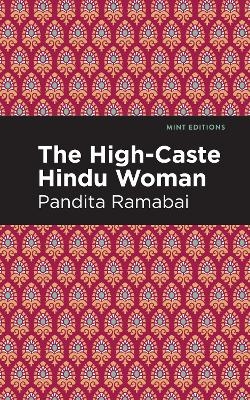
The High-Caste Hindu Woman
Mint Editions (Verlag)
978-1-5132-8010-3 (ISBN)
Arguing for the need to offer education to women, Ramabai examines the nature of life for Hindu women born into the Brahman caste in nineteenth century India. Despite their position in Indian society, these women remained subjected to the control of their husbands, who limited their freedom and social mobility. Ramabai examines the traditions and customs of Hinduism in order to show how women are made ignorant by their oppression and taught to accept their conditions, thereby prolonging the suffering of lower caste and impoverished Hindus. Through education alone, Ramabai shows, are women able to alter their oppressed condition. Both a portrait of Indian life and a moving political treatise, The High-Caste Hindu Woman showcases Ramabai’s foresight as an activist and reformer who sought to radically improve the lives of her people.
With a beautifully designed cover and professionally typeset manuscript, this edition of Pandita Ramabai The High-Caste Hindu Woman is a classic work of Indian political nonfiction reimagined for modern readers.
Pandita Ramabai (1858-1922) was an Indian activist, writer, and social reformer. Taught Sanskrit by her father at a young age, Ramabai was orphaned at sixteen during a period of famine. Around 1876, she began touring India with her brother, reciting Sanskrit scriptures and earning a reputation as a valued scholar and cultural preservationist. At twenty-three, following the death of her husband, a Bengali lawyer, Ramabai moved to Pune where she founded the Arya Women’s Society. As an activist promoting education for women and advocating for the end of child marriage, Ramabai spoke before Lord Riphon’s Education Commission, which led to important reforms. In 1883, Ramabai traveled to Britain to study medicine but was rejected from a number of programs before moving to the United States in 1886. There, she lectured and translated textbooks while writing The High-Caste Hindu Woman (1887), her first book in English. Ramabai returned to India in 1888, where she lectured on behalf of the Women’s Christian Temperance Union. During a period of intense famine in 1896, Ramabai visited remote villages in Maharashtra in order to offer necessary aid to sick and starving women and children. She organized the Mukti Mission, which housed around 1,500 residents by 1900 and continues to operate as a school and women’s shelter today.
| Erscheinungsdatum | 08.04.2021 |
|---|---|
| Reihe/Serie | Mint Editions |
| Co-Autor | Mint Editions |
| Zusatzinfo | Illustrations |
| Sprache | englisch |
| Maße | 127 x 203 mm |
| Themenwelt | Geisteswissenschaften ► Geschichte ► Regional- / Ländergeschichte |
| Geisteswissenschaften ► Religion / Theologie ► Hinduismus | |
| Sozialwissenschaften ► Soziologie ► Gender Studies | |
| ISBN-10 | 1-5132-8010-4 / 1513280104 |
| ISBN-13 | 978-1-5132-8010-3 / 9781513280103 |
| Zustand | Neuware |
| Haben Sie eine Frage zum Produkt? |
aus dem Bereich


